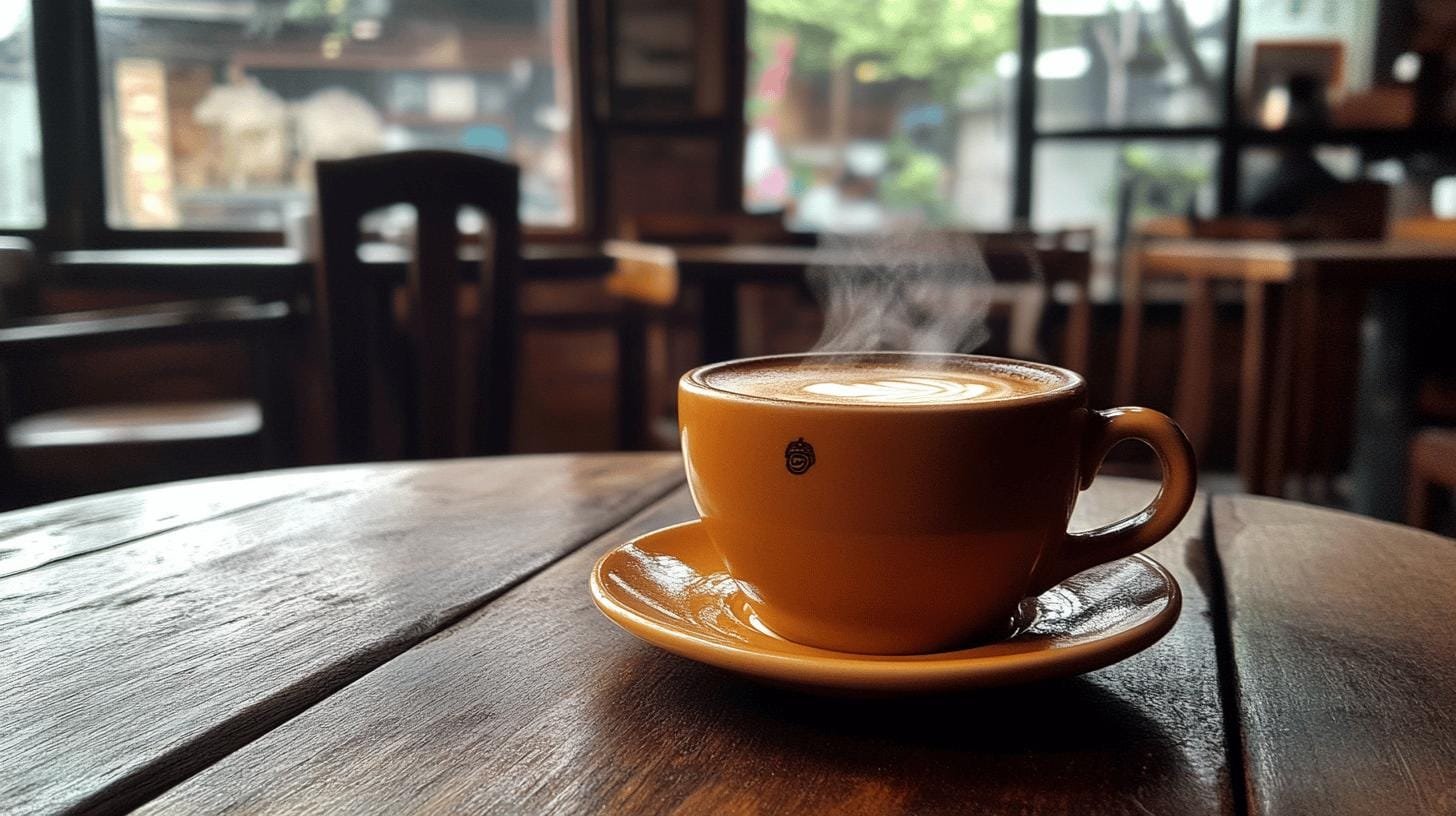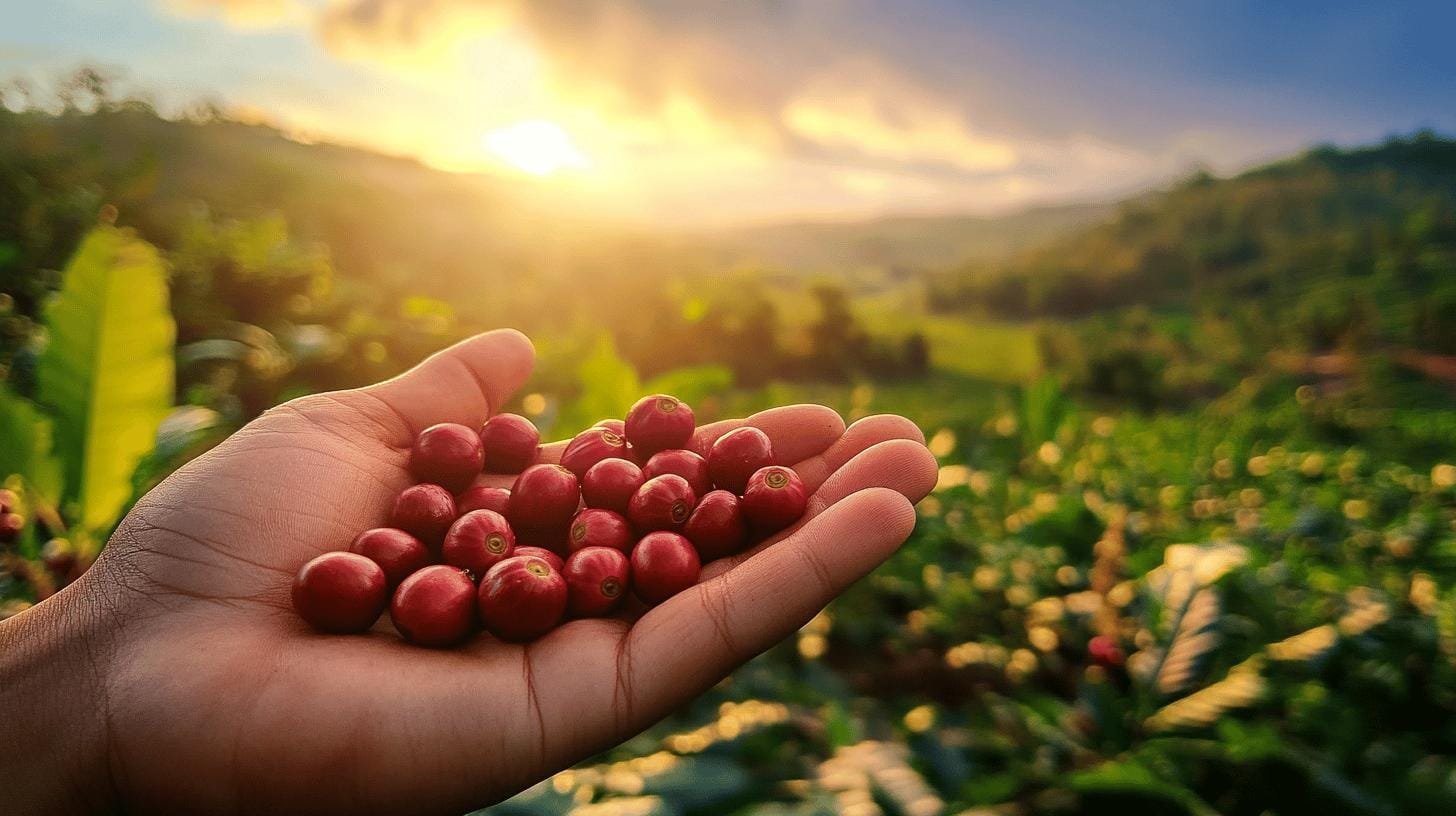What is considered a premium coffee? For many, the answer lies in the meticulous standards that define “premium coffee.” Unlike regular brews, premium coffee stands out through a symphony of factors such as unique microclimates, exceptional bean quality, and precise growing conditions.
It’s set apart by Grade Two green grading: allowing a minimal presence of quakers and defects. Understanding what truly elevates a coffee to premium status not only informs purchasing decisions but also deepens the appreciation for every cup. Dive into the details of what makes a coffee truly “premium.”
Defining Premium Coffee: What Makes It Stand Out
What makes premium coffee different from regular coffee? It starts with high-quality coffee beans and a strict grading system. For instance, a Grade Two green grading allows up to three quakers and 0-8 full defects, which sets it apart from lower grades. Additionally, premium coffee often comes from specific microclimates. These areas have unique humidity and lighting that help develop distinct flavors. With careful cultivation, these conditions enhance the beans’ quality, offering a more nuanced taste experience.
These attributes ensure a superior taste and consistency. The meticulous selection and grading processes highlight the art of coffee production. They also emphasize the importance of origin and processing in creating a premium product.
Exploring the Origins of Premium Coffee Beans

Where a coffee comes from is crucial for its quality and flavor. Premium coffee is often sourced from high-altitude areas. These regions offer ideal conditions like volcanic soil and cooler temperatures. Such factors enhance the beans’ distinct flavor profiles. The careful cultivation ensures the premium quality sought by coffee lovers.
Arabica Coffee Beans
Arabica beans primarily grow in high-altitude regions like Latin America. Volcanic soil and stable climate contribute to their complex flavors, often with chocolate and caramel notes. Cultivating Arabica is labor-intensive due to its vulnerability to pests. Thus, careful handpicking ensures only ripe cherries are harvested. This attention to detail is evident in their taste and higher value, marking them as a premium coffee staple.
Single-Origin Coffee
Single-origin coffee beans are sourced from one location or region, showcasing the area’s unique traits. This concept is central to premium coffee production, emphasizing traceability and authenticity. Single-origin beans offer a distinct flavor experience. By focusing on one region, producers maintain high quality and consistency, meeting premium coffee standards. This method not only highlights flavor complexity but also supports sustainable practices and small-scale farmers.
| Region |
Characteristics |
Flavor Notes |
| Latin America |
High altitude, volcanic soil |
Chocolate, caramel |
| Africa |
Rich biodiversity, diverse climates |
Citrus, floral |
| Asia |
Tropical climate, varied elevations |
Spicy, earthy |
The Role of Processing Methods in Premium Coffee Quality
Processing methods are crucial in shaping a coffee’s flavor and quality. How beans are handled from harvest to drying impacts their chemical makeup and taste. These methods preserve premium coffee’s natural qualities, helping them reach their full flavor and aroma potential.
Common processing methods are wet and dry processes. The wet, or washed method, involves removing the cherry pulp before fermentation, resulting in a clean flavor profile. The dry process involves sun-drying the entire cherry, adding fruity and complex flavors. Unique techniques like honey processing blend these methods, maintaining some pulp to enhance flavor complexity.
These methods significantly impact flavor, aroma, and acidity in premium coffee. Precise processing enhances attributes such as sweetness and complexity, making each cup a personalized experience.
Flavor Profiles and Tasting Notes of Premium Coffee

Premium coffee is known for its nuanced taste, with complex flavor layers that set it apart from regular coffee. Common notes include rich chocolate and hints of caramel, giving sweetness. Fruity undertones add brightness, while nutty accents create depth. The texture is often smooth, providing a velvety mouthfeel that enhances the drinking experience.
These tastes are the result of careful processes from cultivation to roasting. The cupping process plays a vital role. During cupping, tasters evaluate aroma, acidity, body, and flavor under controlled conditions. Each aspect is scored, with higher scores indicating better quality. Aroma offers insight into freshness and potential flavor. This process ensures that premium coffee meets the expected high standards.
The Art of Roasting: Enhancing Premium Coffee Beans
Roasting is transformative. It significantly alters flavor, aroma, and quality by heating green beans. Different roast levels change coffee’s acidity, sweetness, and body, creating distinct experiences. Careful roasting can enhance or diminish these characteristics, crucial for defining premium coffee.
Artisanal roasters use small-batch techniques for consistency and precision, offering a customization mass-production lacks. This craft elevates the coffee experience, reflecting the roaster’s expertise and the beans’ qualities for a superior coffee experience.
Sustainability and Ethics in Premium Coffee Production

Sustainability and ethics are vital in ensuring long-term cultivation viability. Sustainable practices focus on responsible resource use while reducing environmental impact. Fair trade certifications make sure that farmers earn fair wages, supporting community economic stability. This certification also improves social and environmental conditions in these regions. Sustainability forms a foundation for premium coffee that respects both the planet and its people.
Ethical sourcing focuses on transparency and fairness in the supply chain. For producers, it means just trade practices, allowing small growers to thrive and reinvest in communities. For consumers, it means a high-quality, socially responsible coffee experience. By choosing ethically sourced coffee, consumers support human welfare and environmental sustainability, fostering a market valuing ethical production.
Home-Roasted Coffee Beans: The Ultimate Premium Experience
Home roasted coffee beans offer unmatched freshness and customization. Roasting at home gives enthusiasts control over roast levels and bean selection, tailoring the coffee to personal taste. This enhances flavor and maintains optimal freshness, often lost in store-bought beans.
Home roasting supports boutique roasters by showcasing their quality and distinct offerings. By choosing boutique beans, home roasters support artisans who prioritize sustainability and ethics. This encourages a diverse coffee market and promotes high-quality bean cultivation.
Consumers gain access to rare varieties, enriching their experience with each roast. This collaboration advances the premium coffee narrative, focusing on quality, sustainability, and flavor exploration.
Final Words
Premium coffee is defined by its high-quality beans, specific growing conditions, unique flavor profiles, and meticulous processing methods. With origins in high-altitude regions and often single-origin Arabica beans, it offers complex flavors accentuated by precise roasting techniques. Sustainability and ethical sourcing are essential in premium coffee production, supporting small growers and ensuring fair practices.
Understanding what is considered a premium coffee enables consumers to appreciate the artistry behind each cup. Embracing home-roasted beans offers a fresh, customizable experience, highlighting the depth and richness that premium coffee provides.
FAQs
What are premium coffee beans?
Premium coffee beans are identified by their high quality, grown in specific conditions, and featuring unique flavor profiles. Typically originating from microclimates, they are classified by Grade Two green grading with limited defects.
What defines a premium coffee brand?
A premium coffee brand is known for sourcing high-quality beans, ensuring meticulous processing, and providing a superior flavor experience. These brands often emphasize sustainability and ethical practices in their sourcing.
What is considered a premium coffee?
Premium coffee often involves single-origin Arabica beans, characterized by complex flavors and grown at high altitudes, yielding beans with unique taste profiles and enhanced aroma.
What is meant by premium quality coffee?
Premium quality coffee refers to beans that meet strict grading criteria, showcasing superior flavor, minimal defects, and grown in ideal conditions, combined with meticulous processing and roasting.















